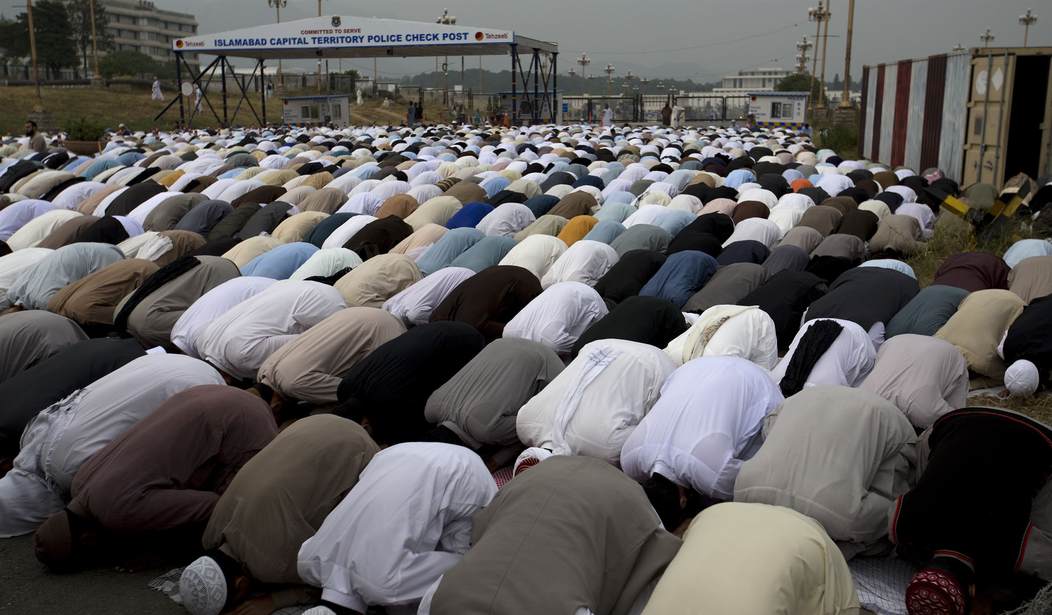A telling incident recently unfolded at the University of Connecticut that vividly illustrates how open-door immigration policies can lead to the introduction of ancient enmities into places where they have never been seen before. With all eyes fixed on Ukraine and Old Joe Biden’s bungling of yet another crisis, it would have been easy to miss what happened in Connecticut, but the events there are worth noting and pondering, as they show what is likely to become a recurring feature of our glorious multicultural mosaic.
It all started back on Feb. 7, when UConn’s Daily Campus reported that the university had “distributed turbahs for Shia Muslim students to use at the Islamic Center of the University of Connecticut (ICUC) and the wellness and meditation space in Homer Babbidge Library, the two main prayer areas on campus for Muslim students.” Turbahs are pieces of dirt or clay from the sacred ground of Karbala that Shi’ite touch to their foreheads during the prostrations of Islamic prayer. These turbahs “were donations to the university and came directly from Iraq.” This was fine and multicultural, but it didn’t go as planned: “the next day, the Ahlul Bayt Student Association at UConn, an organization for Shia Muslim students, found out the turbahs distributed to ICUC had been vandalized and thrown out.”
Was this one of those “Islamophobic hate crimes” we hear about so often and see examples of so seldom? Not unexpectedly, the answer is no. The culprits who disposed of the turbahs were actually Sunni Muslims. Sunnis don’t use turbahs, and generally disapprove of them as bid’a, an unacceptable innovation in Islamic practice. So Sunni UConn students saw the turbahs and unceremoniously pitched them into the trash.
The Daily Campus noted that this sort of thing had happened before: “this is not the first anti-Shia incident to occur at UConn; according to members of the Ahlul Bayt Student Association, an organization for Shia Muslims at UConn, anti-Shia rhetoric has occurred for years. ABSA claims that ICUC has not been a welcoming environment for Shia Muslim students, with ICUC keeping anti-Shia books inside the mosque, and requiring approval for the placement of worshipping items such as turbahs in the space of worship.”
Despite this record of enmity, however, and again according to the Daily Campus, the Sunni Muslim Students Association (MSA) condemned the vandalism and claimed that it had nothing to do with the incident. The MSA had “released a statement condemning the vandalism, claiming that the ICUC executive board had no connection to the attackers. The MSA claimed the e-Board lacked any knowledge that turbahs would be placed in the mosque and reiterated that the placement of any religious items in the mosque requires ICUC approval.” Yet the MSA was less than cooperative and conciliatory: “While MSA claims ICUC apologized to ABSA for the incident and offered to pay for turbahs and discuss concerns, ABSA claims they could not schedule a meeting and that an apology from ICUC was neither direct nor official.”
The Daily Campus added that “given the anti-Shia Muslim hate and the divide between Sunni Muslims and Shia Muslims, more events and educational opportunities should be made available to students to eliminate misconceptions regarding the Shia sect.” The Shi’ites were likewise unhappy about the response it got from the university about this incident: “Furthermore, this incident occurred on Feb. 8 and the UConn administration has yet to publicly condemn and oppose this hate. The UConn administration should address this incident, make it clear that such hate is unwelcome at the university and spare no resources investigating those responsible.”
Related: Virginia: Afghan Convicted of Sexually Assaulting 3-Year-Old Girl, Says it’s Allowed in His Culture
We have heard this kind of thing before, in a slightly different but related context. The Shi’a demand for “more events and educational opportunities” for students, so as “to eliminate misconceptions regarding the Shia sect,” mirrors the longstanding and widespread claim that “Islamophobia” can be stamped out by seminars and outreach events that “eliminate misconceptions.”
Such efforts never actually stamp out “Islamophobia” understood as suspicion or distrust of Islam except among the credulous and ill-informed, because the suspicion and distrust of many people regarding Islam are not based on “misconceptions” at all, but on an actual awareness of Islamic texts and teachings. Likewise, the Shi’ites at the University of Connecticut will realize eventually, if they don’t actually know already, that the Sunni hatred for them stems not from “misconceptions,” but on Sunni teachings regarding Shi’a Islam as a heretical, twisted form of Islam. No educational efforts will undo that conviction.
The Sunni-Shi’ite relationship has been characterized by 1,400 years of violence. We can be grateful that the UConn controversy didn’t involve any violence. But the smart money would be on that violence also arriving here eventually. It has already come to Britain: back in 2014, an 84-year-old non-Muslim, Kenneth Peters, who lived in a Shi’ite area of England, said: “What half of us fear is a load of angry Sunnis from Slough coming here and having a rumble.”
Do you think Mr. Peters had any idea what a Sunni or a Shi’ite was, or that they would always be at each other’s throats in his hometown, when he was 24, or 44, or even 74? Celebrate diversity! There will be much more of this, in Britain and in the United States as well.










Join the conversation as a VIP Member